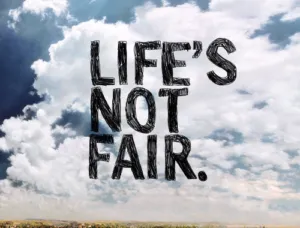
Life can often seem unfair, as individuals and communities struggle to overcome obstacles and achieve their goals. This sense of injustice can stem from a variety of factors, including discrimination, marginalization, oppression, and poverty. These issues are deeply rooted in our society and are perpetuated by systemic inequality and a lack of access to resources and opportunities.
One of the main reasons why life can seem unfair is discrimination. Discrimination occurs when people are treated differently based on characteristics such as their race, gender, sexual orientation, or socioeconomic status. This can take many different forms, from overt acts of discrimination, such as denying someone a job or a promotion because of their race, to more subtle forms of bias, such as assuming that a person of a certain race or gender is less capable or intelligent. Discrimination can have a profound impact on an individual's life, limiting their opportunities and access to resources and leading to feelings of frustration and hopelessness.
Another reason why life can seem unfair is marginalization. Marginalization occurs when certain groups of people are excluded from mainstream society and denied equal access to resources and opportunities. For example, people with disabilities, immigrants, and refugees may be marginalized and denied the same rights and opportunities as others. They may face barriers to housing, healthcare, education, and employment, and may be subjected to discrimination and abuse. Marginalization can lead to feelings of isolation and exclusion, and can perpetuate cycles of poverty and hardship.
Oppression is another reason why life can seem unfair. Oppression occurs when a group of people is systematically and deliberately denied their basic rights and freedoms. This can take many different forms, such as political oppression, economic oppression, or social oppression. Political oppression can take the form of censorship, surveillance, and repression of dissent. Economic oppression can take the form of exploitative labor practices, wage theft, and discrimination in hiring and promotion. Social oppression can take the form of hate crimes, harassment, and violence against marginalized groups. Oppression can lead to feelings of powerlessness and fear, and can have a devastating impact on individuals and communities.
Poverty is another major reason why life can seem unfair. Poverty is a pervasive issue that affects millions of people around the world, and is caused by a variety of factors, including lack of access to education, healthcare, and economic opportunities. It is also perpetuated by systemic inequality and discrimination, as well as by economic policies that benefit the rich at the expense of the poor. Poverty can lead to feelings of hopelessness and despair, and can have a devastating impact on individuals and communities, making it difficult to escape the cycle of poverty and hardship.
To address these injustices, we must work together to create a more just and equitable society. This means taking action to address discrimination, marginalization, oppression, and poverty. It means working to create equal access to education, healthcare, and economic opportunities for all. It means challenging and changing the systems and structures that perpetuate these injustices, and working to ensure that everyone has the opportunity to live a fulfilling and prosperous life.
One of the key ways to address these injustices is through education. Education is a powerful tool for empowering individuals and communities, and can help to break the cycles of poverty and oppression. By providing access to education, especially for disadvantaged children, we can ensure that they have the skills and knowledge they need to succeed in life. This can be done by investing in education, providing more funding to schools that serve low-income communities and providing more opportunities for professional development to teachers.
Another way to address these injustices is through policy changes. Governments have a responsibility to ensure that everyone has access to the resources and opportunities they need to succeed in life. This means investing in education, healthcare, and economic development.